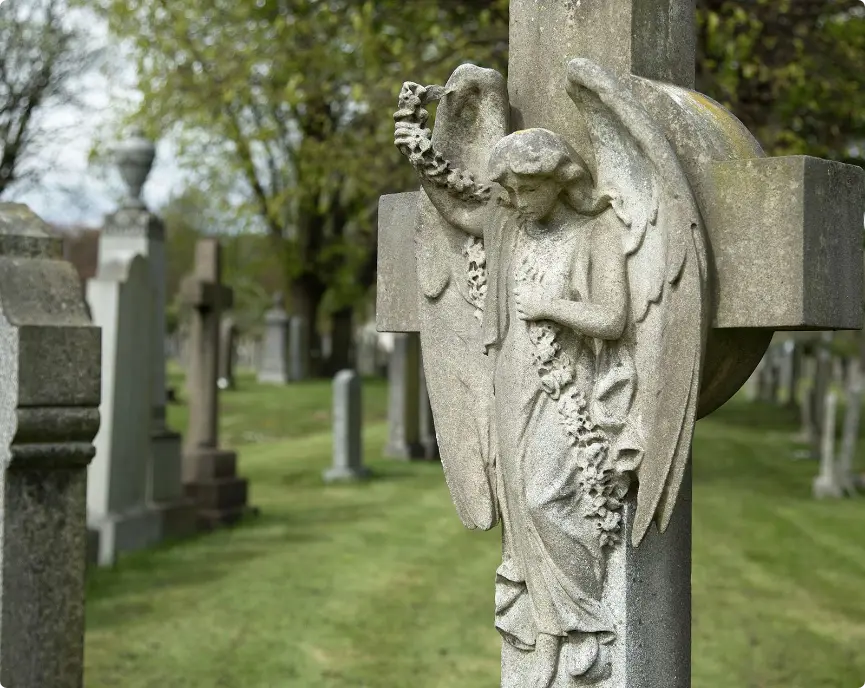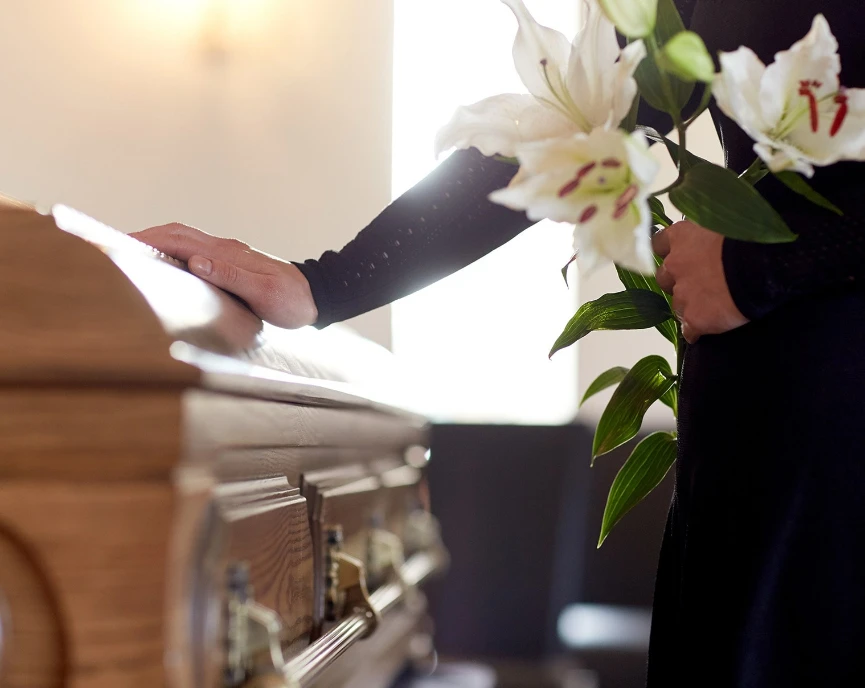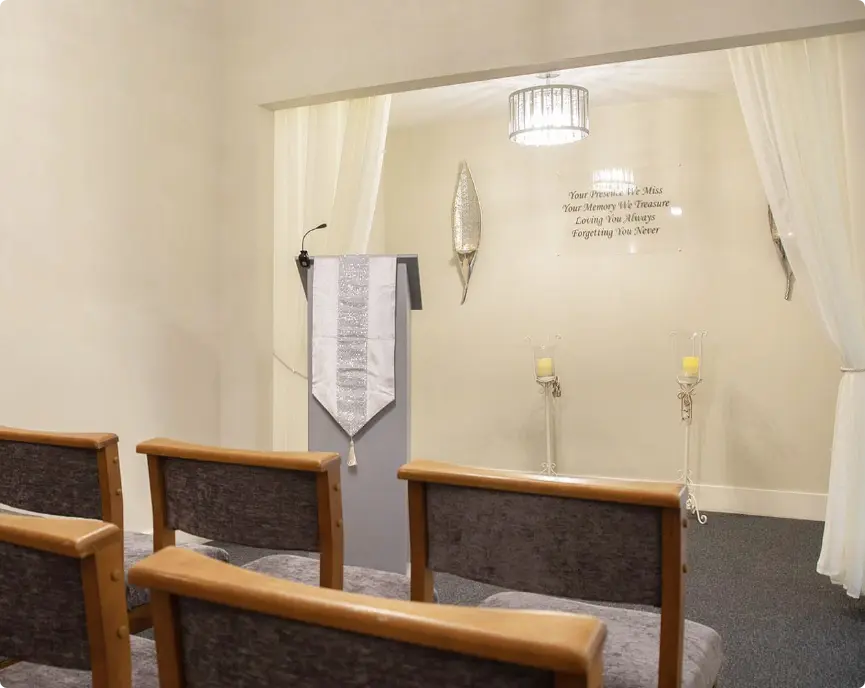FAQS
Understanding Your Funeral Arrangements
Navigating funeral arrangements can be a challenging and emotional time. This section provides clear answers to frequently asked questions, aiming to offer support and guidance as you make important decisions.
Categories:
- Categories:
- About Abercorn
- Bereavement Support
- Costs & Financial
- Funeral Arrangements
- Funeral Donations
- Funeral Support Payment
- General
- Headstones and Memorials
- Help with Funeral Costs
- How to Personalise a Funeral
- How to Register a Death
- Types of Funeral Services
- When Someone Dies
- Writing a Eulogy
- Writing an Obituary
About Abercorn
-
What kind of support can I expect from your team?
Our experienced and dedicated team offers warmth, understanding, and genuine concern. We will guide and support you at every step of the process, giving you the time to make your own informed choices without pressure. We see you as an extension of our family and will wrap our arms around you to help make this difficult time a little easier. -
What is the core philosophy of Abercorn Funeral Services?
Our core philosophy is built on the values of Honesty, Care, and Sincerity. We pride ourselves on being Edinburgh's and Lothian most caring, sensitive, and reputable independent funeral service. Our entire hand-chosen team works like an extended family with one goal: to care for your family as if they were our own, with the utmost respect and dignity. -
How will my loved one be cared for?
You can feel safe in the knowledge that your loved one will be treated with genuine care, dignity, and respect in every aspect of our service. Regardless of which funeral package is chosen, every person who comes into our care is treated exactly the same, as we would a member of our own family.
Bereavement Support
-
What if I need to talk to someone urgently or outside of normal hours?
The Samaritans offer confidential emotional support 24 hours a day, 7 days a week. They are there to listen if you are experiencing distress, despair, or suicidal feelings. You can call them for free at any time on 116 123 or visit their website. -
Where can I find practical advice after someone has died?
The Bereavement Advice Centre provides information and advice on the practical matters people face following a death. You can call them for free at 0800 634 9494 or visit their website. -
Are there any charities that specialise in bereavement support?
Cruse Bereavement Care is the leading bereavement charity in the UK. They offer free support, information, advice, and training for bereaved people. You can contact them on their freephone number at 0808 808 1677 or find more information on their website. -
Where can I find general emotional support?
Support Line provides confidential emotional support for children, young adults, and adults by telephone, email, and post. You can call them at 01708 765 200 or visit their website.
Costs & Financial
-
How much do your funeral services cost?
Our services are tailored to each family’s needs, with clear pricing and no hidden fees. Costs vary depending on the type of service and choices made. -
Do you offer affordable options like Direct Cremation?
Yes. Direct Cremation is one of our most cost-effective offerings. We also provide simple funeral options that respect both budget and wishes. -
Are your prices competitive?
We aim to offer high-quality care at fair, competitive prices. We’re happy to discuss your needs and provide comparisons. -
Will I receive a clear breakdown of all costs?
Absolutely. Transparency is essential to us. You’ll receive a detailed quote explaining all fees, including optional services. -
Do prices include third-party costs (disbursements)?
Our quotes clearly indicate third-party costs (such as crematorium fees, burial ground costs, clergy/celebrant fees, floral tributes and orders of service, etc.) so there are no surprises. -
What if I have a specific budget in mind?
Please let us know—many families do. We’ll help you create a meaningful farewell within your budget, offering suggestions and guidance.
Funeral Arrangements
-
What are the main decisions I need to make about the funeral service itself?
When planning the service, you should consider several key elements: Type of service: Decide if you would like a traditional service, a memorial, a celebration of life, or a combination of these. Location: This can range from a funeral home or another location that was meaningful. Officiant: Choose who will lead the service, whether it's a celebrant, humanist, priest, family member, or friend. Casket or urn: Consider the preferences of the deceased when making this choice. Order of Service: Plan the schedule of events, including any readings, music, or personal tributes. Personalisation: Think about incorporating unique, personal touches to honour the life and memory of your loved one. -
How should I inform people about the death and any gatherings?
Obituary and death notice: You can write a personal obituary and also consider placing a notice in local newspapers or online. Reception or gathering: Arranging a reception allows family and friends to come together to share memories and support one another. Communicating with family and friends: It is important to keep close family members and friends informed of any plans and updates. -
What is a final, important thing to remember during this process?
While you are busy with arrangements, it is crucial to take care of yourself. This is a very difficult time, so remember to look after your own well-being and seek support from friends, family, or professionals if you need it
Funeral Donations
-
How do we decide where to direct funeral donations?
The first and most important factor is the family's wishes. Consider whether the deceased had any specific charities, organisations, or other meaningful causes they would have wanted to support. -
Are there any financial considerations when choosing a charity?
Yes, you should consider the tax implications. Check if the charities or organisations you are considering are registered as non-profit, as this can determine if donations are eligible for tax benefits. -
How do we inform people that we are requesting donations instead of flowers?
Clear donor communication is key. If the family decides to request donations, this information should be clearly communicated in the obituary or the funeral announcement. -
Are there alternatives to monetary donations?
In addition to financial contributions, there may be other ways to support the family or honour the memory of the deceased. These can be discussed and decided upon by the family.
Funeral Support Payment
-
What government help is available for funeral costs in Scotland?
For some qualifying families, government help may be available through the Funeral Support Payment and/or the Bereavement Support Payment. Please see below for links and information. -
What is the Funeral Support Payment?
This payment is available to people in Scotland who require support to meet the costs of a funeral. The Funeral Support Payment is for people on certain benefits or tax credits. -
How do I apply for the Funeral Support Payment?
Telephone – call freephone on 0800 182 2222 to complete the application over the phone. Paper – call freephone at 0800 182 2222 to request a paper application. Online – go to this link and complete the online application. There are two forms to complete: one for a child/young person and one for an adult. -
Who is eligible to apply for the Funeral Support Payment?
The adult's spouse or civil partner. Neither married nor in a civil partnership but living together for at least six months. The adult's child. The adult's parent. The adult's brother or sister. The adult's grandchild. The adult's uncle or aunt. The adult's cousin. The adult's niece or nephew. -
How much is the payment, and what does it cover?
Your Funeral Support Payment is a partial payment and will cover some, but not all, funeral costs. The amount will depend on the amount claimed and what funds were left by the deceased. For burial and cremation costs (these vary throughout the country); please visit this site. A maximum of £700 will be put towards the Funeral Director and any other expenses. Or £120 if the deceased had a funeral plan in place. Some travel, document, and medical costs may also be covered. -
How many people can get the payment and when?
Only one person per funeral should apply, and only one payment will be made. Before applying, the claimant should register the death and give Abercorn the consent to speak with Social Security Scotland. This will minimise the time taken to process the application. Claims can be made up to six months after the funeral date. -
What evidence will be required?
Invoices/receipts for the items being claimed. A full funeral account can be made available from us. The claimant can be sent a pre-paid envelope to return the documents to Social Security Scotland. -
How long will people have to wait for the payment?
The claimant should receive a decision within ten working days upon SSS's receipt of a completed application form and all supporting evidence. -
Who is paid the money?
The funds will be paid directly to the claimant's financial account or the funeral director. -
Does this money need to be paid back?
The claimant does not need to pay back the funds. If it is discovered the deceased left financial assets, the SSS will recover the Payment through the estate. -
Does it affect other benefits?
No, the Payment does not affect any other benefits or tax credits.
General
-
What are the options for scattering or interring ashes?
Ashes can be scattered in meaningful places (with permission), interred in a grave or columbarium, or kept in a decorative urn at home (which we can help you source). We can advise you on local rules and memorial options. -
What is a columbarium?
A columbarium is a structure with niches to respectfully house urns containing cremated remains. It offers a permanent resting place in a peaceful setting and may be part of a cemetery or memorial garden. -
What if I change my mind?
We understand that making funeral arrangements can feel overwhelming, and it's perfectly natural to have second thoughts. If you change your mind about any aspect of the service, please let us know as soon as possible. We will work with you to adjust the arrangements, explain your options clearly, and ensure your wishes are respected. Our goal is to support you with flexibility, transparency, and compassion throughout the process. -
How do I choose a memorial or headstone?
We’ll guide you through materials, design, and inscription options. We also ensure compliance with cemetery regulations and offer expert advice to help you create a fitting tribute. -
Can I personalise a memorial or headstone?
Yes, memorials can be customised, and we’re happy to make changes during the design stage and understand this must be right for every family. -
What materials are used for your memorials?
We offer high-quality materials such as granite, marble, and natural stone in a variety of finishes and colours. Our team will help you select the most suitable material based on durability, aesthetics, and budget. -
What is the process for ordering a memorial?
Our process includes consultation, design approval, inscription planning, and installation. We’ll manage the details and liaise with the cemetery to ensure all guidelines are met. -
How do you ensure the quality of your memorials?
We work with skilled stonemasons and trusted suppliers, using only premium materials. All memorials are crafted to high standards and inspected before installation. -
Can you advise on cemetery regulations for memorials?
Yes. Each cemetery has specific rules regarding size, materials, and inscriptions. We’ll guide you through these requirements to avoid delays or issues. -
My loved one has just passed away. What should I do first?
We are deeply sorry for your loss. Please know you can call us anytime – day or night, seven days a week – and we will gently guide you through the very next steps. Our team can promptly arrange for your loved one to be brought into our dignified care, and we will help you begin to make the necessary arrangements with the utmost respect. -
Are you available after hours or on weekends?
Yes, absolutely. Our dedicated team is on call 24 hours a day, 7 days a week. We are always here when you need us most, providing continuous support and care. -
What types of funeral services do you offer?
We offer a full range of dignified and personal services, ensuring a respectful farewell that truly reflects your loved one. This includes traditional funerals, cremation services, thoughtful memorial gatherings, and personalised celebrations of life. We also proudly care for two local cemeteries and have a dedicated monumental masonry department ready to assist with headstones, plaques, and other lasting memorial tributes. -
How much do your services cost?
We believe in transparency and honesty, especially concerning costs. We provide clear, competitive pricing and a variety of service options designed to suit diverse needs and budgets. Whether you are seeking a simple, dignified arrangement or a more comprehensive service, we will always talk you through everything with genuine care and complete clarity, ensuring peace of mind. -
Do you offer funeral packages or custom arrangements?
Yes, we thoughtfully offer both carefully curated service packages and fully tailored arrangements. Our primary goal is always to make this process as straightforward, comforting, and personal as possible for you and your family. -
Can you help with paperwork and legal documents?
Absolutely. We understand that administrative tasks can be daunting at such a time. We will sensitively take care of all the necessary paperwork on your behalf, including obtaining death certificates, and can assist with important notifications to government services such as Social Security or the local registry office. -
Can you help with writing and placing an obituary?
Yes, we would be honoured to help you craft a meaningful and personal obituary that beautifully captures the essence of your loved one's life. We can also respectfully arrange for its publication in local newspapers or its sharing online, as you wish. -
Can the service be personalised?
Of course, personalisation is at the heart of what we do. We wholeheartedly welcome any personal touches that respectfully reflect and celebrate your loved one’s unique life. This can include special music, cherished photo displays, cherished religious customs, poignant readings, or treasured family traditions. Our aim is to create a farewell that is as individual as the life lived. -
What is embalming and is it necessary?
Embalming is a process that involves the temporary preservation of the deceased using special fluids. It can help to delay natural decomposition, improve appearance for viewing, and allow more time between death and the funeral. Embalming is not always necessary and is often optional, depending on the type of service chosen. For example, it may be recommended for prolonged open-casket viewings or if a family wish to take their loved one home before the funeral, but it is usually not required for direct cremation/burial or standard timescale funerals. -
Can we hold a viewing or visitation?
Yes, we can arrange a viewing or visitation as part of the funeral service. This provides an opportunity for family and friends to say their goodbyes in a peaceful setting at one of our funeral parlours. We can tailor the timing and setting to meet your preferences. -
What is the difference between burial and cremation?
Burial involves placing the deceased in a coffin and interring it in a grave, typically within a cemetery. Cremation uses heat to return the deceased to ashes, which can then be kept, scattered, or interred. Both are respectful options, and the choice depends on personal, religious, or cultural preferences. -
Do you offer green or eco-friendly funeral options?
Yes, we offer environmentally conscious choices, including biodegradable coffins, natural burial grounds, and services that minimise environmental impact. We’re happy to guide you through sustainable options that align with your values. -
Can we arrange a funeral if our loved one passed away abroad or out of the area?
Absolutely. We handle repatriation services and can coordinate with international and regional authorities to return your loved one home. We also arrange funerals for deaths that occur outside our local area, ensuring all paperwork and logistics are taken care of. -
What happens at a committal service at the crematorium or graveside?
The committal is the final part of the funeral, held at the place of burial or cremation. It may include prayers, readings, or quiet reflection near the end of the funeral service. It provides a moment of closure and is deeply meaningful for many families. -
Can we choose the music, readings, or a celebrant for the service?
Yes. Personalising the service with music, poems, readings, or a chosen celebrant—whether religious or non-religious —can make it more meaningful. We encourage families to be involved in shaping the service. -
How long after death does the funeral usually take place?
Funerals generally occur within 7 to 14 days after death, but timing can vary. Factors include registration, official paperwork, venue availability, and family circumstances. We’ll guide you through every step to plan the right time. -
Do you offer grief support or bereavement resources?
Yes, we’re committed to support beyond the day of the funeral. We can offer access to grief support groups, counselling services, and trusted resources in the local community. -
What should I wear to a funeral?
Traditionally, dark and respectful clothing is worn. However, modern funerals may have different requests—such as bright colours or specific themes. We advise checking any guidance from the family. -
Can children attend funerals?
Yes, children can attend funerals, and doing so can be a helpful part of the grieving process. We can offer guidance on how to support children during the service in an age-appropriate way; however, this is always a family choice, and we respect any decision made. -
What is a direct cremation/direct burial, and how does it differ from a traditional service?
A direct cremation or burial takes place without a funeral ceremony or any mourners present. It’s a simpler, more cost-effective option. Families often choose to hold a separate memorial or celebration of life at a later date. -
Are there restrictions on the size of headstone?
Each cemetery will have their own rules and regulations on size and width of headstone allowed. -
Do you need permission to erect a headstone on a grave?
Yes, each cemetery will require an application to be signed by the lair holder, along with a copy of the title deed/lair certificate. -
How do I pay for the headstone?
We ask for a 50% deposit when the headstone gets ordered and the remaining balance to be paid before the headstone is erected in the cemetery. -
How soon after burial can a stone be erected?
The average time to wait is 6 months to give the ground time to settle, although this can be longer depending on the ground. -
Would I get a proof of the inscription on the headstone before the works is carried out.
Yes, we would supply you with a proof of how the inscription and layout will look on the headstone for you to approve before any inscription work is carried out.
-
I’ve seen a memorial I like but it is not on your webpage, would you be able to source it?
In most cases we would be able to source it and give you a quote.
Headstones and Memorials
-
How do I pay for the headstone?
We ask for a 50% deposit when the headstone gets ordered and the remaining balance to be paid before the headstone is erected in the cemetery. -
How soon after burial can a stone be erected?
The average time to wait is 6 months to give the ground time to settle, although this can be longer depending on the ground. -
Are there restrictions on the size of headstone?
Each cemetery will have their own rules and regulations on size and width of headstone allowed. -
Do you need permission to erect a headstone on a grave?
Yes, each cemetery will require an application to be signed by the lair holder, along with a copy of the title deed/lair certificate. -
Would I get a proof of the inscription on the headstone before the works is carried out?
Yes, we would supply you with a proof of how the inscription and layout will look on the headstone for you to approve before any inscription work is carried out.
Help with Funeral Costs
-
How does Abercorn Funeral Services manage the funeral arrangements and costs?
We will supervise all arrangements during and after the service, including liaising with all third parties such as the church, clergy, crematorium, cemetery, and florist. We offer professional services at a fixed price covering the entire funeral arrangement, with no hidden fees. Once you have made your personal choices, we will give you a written estimate of the funeral costs. Note: Costs of a funeral are defined as a debt against the estate, so you may be able to arrange for the funeral to be paid by the estate rather than paying yourself. -
What should I do if I am worried I can’t afford the funeral?
Trouble meeting funeral costs? Then discuss this with us at the time of arrangement. You may be able to apply for a Social Fund Funeral Payment to help with funeral costs. If you do not qualify for a payment, we may still be able to advise you on other forms of assistance. -
Where can I get more information about government support for funeral costs?
For more information, visit Social Security Scotland or call 0800 182 2222
How to Personalise a Funeral
-
Can we incorporate food and drink into the arrangements?
Yes, serving the favourite foods, drinks, or even recipes of the deceased during any post-funeral gatherings or receptions is a lovely and very personal touch. -
How can we involve other people in personalising the service?
You can encourage family members, friends, or community members to share special readings or tributes. This could include readings, poems, or personal tributes shared during the funeral service. -
What different types of funeral services are available?
There are several options to suit different needs. We can guide you through each one to help you decide. The main types are Bespoke, Classic, Direct, and Child's Funerals. -
What does a Classic Funeral include?
The Classic Funeral includes the Funeral Director's fees, the collection and care of the deceased, a Glenshee Coffin, a hearse, and all necessary staff. Read more here. -
What is a Child’s Funeral?
Our commitment is to carry out the funeral arrangements for children up to the age of 18 without making a charge for our services. Read more here. -
How can we make the funeral service a more personal reflection of our loved one?
Personalising the day involves incorporating elements that reflect the life, personality, and interests of the deceased. This creates a heartfelt tribute that honours their unique life and legacy. -
How can we use music to personalise the service?
Think about what music represented their personality. You could include their favourite songs, music from significant moments in their life, or pieces that evoke fond memories for family and friends. -
What are some ideas for using photos?
Photo displays are a wonderful way to share memories. Consider creating a photo slideshow featuring images of the deceased throughout their life, making sure to include special moments, milestones, and cherished memories.
How to Register a Death
-
What documents and information do I need to register a death?
The Registrar will help with all certificates when a death is registered. Where appropriate, as well as your other certificates, take the deceased's National Health Service Medical Card or Number, National Insurance Number, and Birth and Marriage Certificates. Do not worry if any of these documents are unavailable. The Registrar can still proceed to register the death. The Registrar may also require: The full names and addresses of the deceased, occupation, and date of birth. The name and occupation of the widow or widower or, if married more than once, the names and occupations of former wives and husbands. The date of birth of the surviving spouse. The deceased's father's full name and occupation, the mother's full name, maiden surname, and occupation. The name and address of the deceased's doctor. The address of the person giving the above information. -
What will I receive from the Registrar?
When you register the death, the Registrar will provide you with: A Form 14-Certificate of Registration of Death that should be handed to the Funeral Director (it takes charge of the arrangements). An abbreviated death certificate. A fee is payable if you require a full death certificate for legal purposes. A green certificate that is useful for any transactions with the Department of Work and Pensions. -
What is the Registar’s contact details?
NHS Registration -
What happens when a death occurs?
Firstly, obtain a Medical Certificate of Cause of Death, signed by a doctor. If a Procurator Fiscal is involved – they should follow the instructions from the Procurator Fiscal Officers' regarding registration of the death. -
How and when do I register the death?
Deaths in Scotland must be registered with The Registrar of Births, Deaths, and Marriages within eight days; it is desirable to register the death as soon as possible. In Edinburgh, you can register a death at the following offices (appointment only): NHS Registration.
Types of Funeral Services
-
What is a Bespoke Funeral?
A Bespoke Funeral is a completely tailored service that is specially and meticulously created for your loved one. Every detail is taken care of to ensure their memory is honoured in a personal and unique way. -
What is a Direct Funeral?
A Direct Funeral is a modern, uncomplicated, and low-cost option for those who prefer a departure from traditional services. It is a respectful farewell without elaborate ceremonies or mourners present, which allows families the opportunity to host a separate memorial event or celebration of life at a later date. -
What kind of Funeral suits your needs?
There are many options to think about. We can take you through each one, helping you decide what type of funeral you wish for your loved one. -
What is included in the Purely Funeral package?
The Purely Funeral is a gentle and affordable option that includes all Funeral Director's fees, the Crematorium or Interment cost, a quality fully lined Glenshee coffin (in position at crematorium/cemetery), a visit to the chapel of rest, and a Funeral Director in attendance on the day. -
What is a Classic Funeral?
The Classic Funeral is for those who want a simple funeral that doesn't include many of the more traditional funeral elements. It is an all-inclusive package. -
Do you offer funeral services for children?
Funerals are hard, whatever the age of the person you have lost, but none more so than the death of a child. We have made a commitment to carry out the funeral arrangements for children up to the age of 18 years without making a charge for our services.
When Someone Dies
-
What should I do if my loved one passes away at home?
Call us immediately. We will guide you through the next steps, including contacting a doctor and arranging transportation. We’re here to support you 24/7. -
What happens if a loved one passes away in a hospital or hospice?
The staff will usually inform you of the next steps, and you can then contact us. We’ll liaise with the hospital and coordinate the transfer and arrangements. -
What if the death was unexpected or occurred suddenly?
In sudden or unexpected cases, the coroner/procurator fiscal may be involved. Once they release your loved one, we’ll begin arrangements. We’ll help you navigate the process with care and clarity.
Writing a Eulogy
-
Where should I start when writing a eulogy?
Begin by reflecting on the life of the deceased. Think about their passions, their personality, and the impact they had on you and others. It’s also a good idea to reach out to family and friends to gather their memories, stories, and anecdotes. -
What should be the main focus of the eulogy?
The eulogy should celebrate the person's life and positive attributes, focusing on how they touched the lives of others. The most important thing is to speak from the heart and be genuine in your expression of love and gratitude. -
How do I balance the tone of the eulogy?
While seriousness is a natural part of a eulogy, it is perfectly acceptable to inject some humour to reflect the person's personality and share happy memories. Think about what your audience would want you to say and find a balance that feels right. -
Is there anyone I should make sure to mention in the eulogy?
It is a thoughtful gesture to express gratitude to those who supported the deceased. This may include caregivers, close friends, and family members.
Writing an Obituary
-
What is the purpose of an obituary?
An obituary serves to honour and memorialise the deceased while also informing the wider community of their passing. -
What essential information should I include at the beginning of the obituary?
You should start with the basic information about the deceased, which includes their full name, age, date of birth, and date of death. -
Who from the family should be mentioned?
It is customary to include the names of the deceased's immediate family members. You can also mention other close relatives if you wish. It is also common to mention any family members who have predeceased the deceased, as well as those who are surviving. -
What details about the funeral or memorial service should be included?
You should provide clear information about any funeral or memorial services that are being held for the deceased, including the date, time, and location. -
Can we request donations instead of flowers?
If the family prefers, you can suggest that people make charitable donations or contribute to a memorial fund in lieu of sending flowers.
Contact
We will help you at every stage of the process
Call, email, or visit one of our funeral homes at any stage. We’re here to talk you through any decision that concerns you.Contact Form







